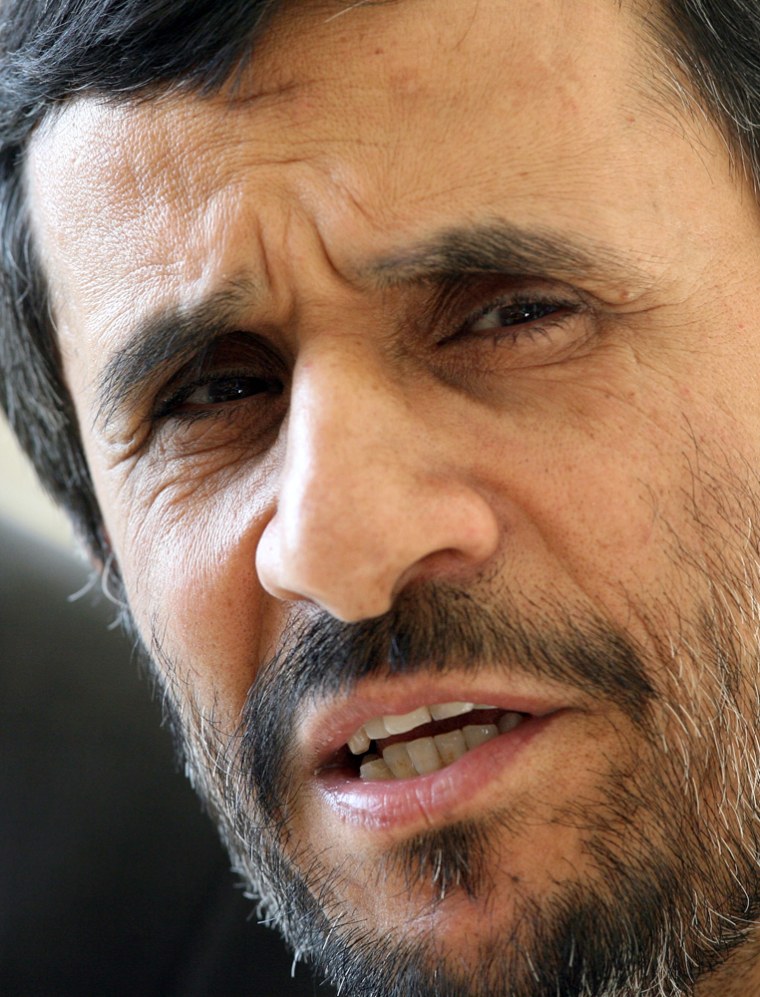Iran's president called for the U.S. to apologize for past misdeeds Wednesday but also said the country would welcome a real and fundamental shift in foreign policy from the new American administration.
Mahmoud Ahmadinejad's comments came after President Barack Obama indicated a new willingness to reach out to Muslims and the importance of engaging with Iran, a country the Bush administration often singled out as the most dangerous in the region.
Without mentioning Obama by name, Ahmadinejad repeatedly referred to those who want to bring "change," a word used often in Obama's election campaign, and seemed to indicate Iran would be looking to see whether there would be substantive differences in U.S. policy under Obama.
"We will wait patiently, listen to their words carefully, scrutinize their actions under a magnifier and if change happens truly and fundamentally, we will welcome that," Ahmadinejad said, speaking to a crowd of thousands in the western city of Kermanshah.
'Dark background'
But the Iranian leader also criticized the U.S. and demanded an apology.
"Those who say they want to make change, this is the change they should make: they should apologize to the Iranian nation and try to make up for their dark background and the crimes they have committed against the Iranian nation," Ahmadinejad said.
He listed a range of "crimes" such as trying to block what Tehran says is a peaceful nuclear power generation program, hindering Iran's development since the 1979 revolution and other actions by several administrations for more than 60 years.
He also called on Washington to withdraw its troops from around the world and stop supporting Israel.
In his speech, Ahmadinejad said: "Who has asked them (the United States) to come and interfere in the affairs of nations?
"Change means giving up support for the rootless, uncivilized, fabricated, murdering... Zionists and let the Palestinian nation decide its own destiny," he said. "Change means putting an end to U.S. military presence in (different spots of) the world."
Speaking in his first formal television interview as president, Obama told Al-Arabiya news channel that Iran must "unclench its fist".
Direct talks?
The new administration has said Obama would break from his predecessor by pursuing direct talks with Tehran but has also warned Iran to expect more pressure if it did not meet the U.N. Security Council demand to halt its disputed nuclear work.
Washington and its Western allies accuse Iran of seeking to build nuclear weapons. Tehran denies the charge and refuses to give up work it insists is its sovereign right.
The U.S. also accuses Iran of sponsoring "terrorists" and undermining efforts to make peace in the Middle East between Israel and Arabs.
Echoing Obama's remarks, U.S. Secretary of State Hillary Clinton signaled the administration's readiness to talk to Iran, saying Tuesday that Tehran had a "clear opportunity" to show the world it is willing to engage.
She told reporters that the U.S. administration is undertaking a wide-ranging and comprehensive survey of U.S. foreign policy options toward Iran.
Iranian Deputy Foreign Minister Mehdi Safari, speaking in Athens, Greece, said Tuesday that it was too early to say whether relations with the United States would improve with Obama as president.
The U.S. broke off diplomatic relations with Iran in 1979 after hardline students stormed the U.S. Embassy in Tehran.
